Related Research Articles

Solidarity, full name Independent Self-Governing Trade Union "Solidarity", is a Polish trade union founded in August 1980 at the Lenin Shipyard in Gdańsk, Poland. Subsequently, it was the first independent trade union in a Warsaw Pact country to be recognised by the state.
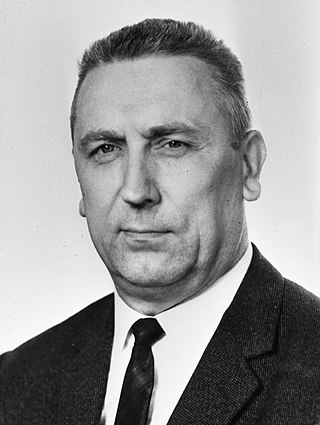
Edward Gierek was a Polish Communist politician and de facto leader of Poland between 1970 and 1980. Gierek replaced Władysław Gomułka as First Secretary of the ruling Polish United Workers' Party (PZPR) in the Polish People's Republic in 1970. He is known for opening communist Poland to the Western Bloc and for his economic policies based on foreign loans. He was removed from power after labor strikes led to the Gdańsk Agreement between the communist state and workers of the emerging Solidarity free trade union movement.

Leszek Henryk Balcerowicz is a Polish economist, statesman, and Professor at Warsaw School of Economics. He served as Chairman of the National Bank of Poland (2001–2007) and twice as Deputy Prime Minister of Poland.

Tadeusz Mazowiecki was a Polish author, journalist, philanthropist and politician, formerly one of the leaders of the Solidarity movement, and the first non-communist Polish prime minister since 1946, having held the post from 1989 to 1991.
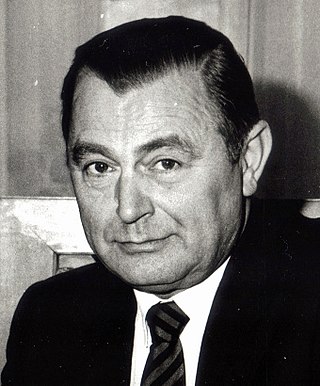
Zbigniew Stefan Messner was a Communist economist and politician in Poland. His ancestors were of German Polish descent who had assimilated into Polish society. In 1972, he became Professor of Karol Adamiecki University of Economics in Katowice. He was a member of the Central Committee of the Polish United Workers' Party from 1981 to 1988, Deputy Prime Minister from 1983 to 1985, and 53rd Prime Minister from 1985 to 1988.

Danuta Maria Hübner is a Polish politician and Diplomat and Economist and Member of the European Parliament. She has served as European Commissioner for Regional Policy from 22 November 2004 until 4 July 2009, when she resigned to become a Member of European Parliament for the Civic Platform. In 2012, Professor Hübner became a member of the International Honorary Council of the European Academy of Diplomacy.
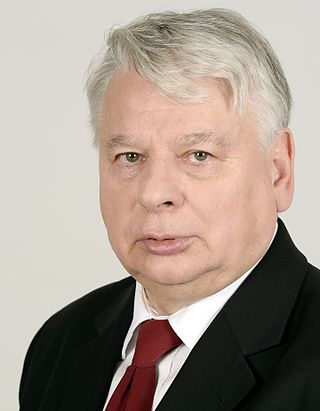
Bogdan Michał Borusewicz is a Polish politician who served as the Marshal of the Polish Senate from 20 October 2005 to 11 November 2015. Borusewicz was a democratic opposition activist under the Communist regime, a member of the Polish parliament (Sejm) for three terms and first Senate Marshal to serve two terms in this office. He served as the Acting President of Poland for a few hours in 2010.
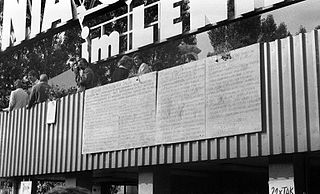
The 21 demands of MKS was a list of demands issued on 17 August 1980 by the Interfactory Strike Committee in Poland.
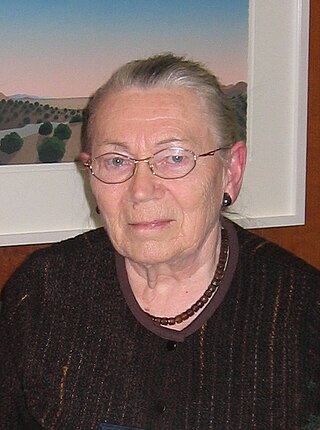
Anna Walentynowicz was a Polish free trade union activist and co-founder of Solidarity, the first non-communist trade union in the Eastern Bloc. Her firing from her job at the Lenin Shipyard in Gdańsk in August 1980 was the event that ignited the strike at the shipyard, set off a wave of strikes across Poland, and quickly paralyzed the Baltic coast. The Interfactory Strike Committee (MKS) based in the Gdańsk shipyard eventually transformed itself into Solidarity; by September, more than one million workers were on strike in support of the 21 demands of MKS, making it the largest strike ever.

Independent Students' Association is a Polish student society, created in October 1980, in the aftermath of the Gdańsk Agreement and the anti-government strike actions. It was a student arm, or suborganization, of Solidarity, and together with it, as well as other similar organizations, was banned after the implementation of martial law in Poland. Some activists were arrested, and others organized an underground NZS. After the fall of Communism in 1989, the organization was recreated, and its focus was changed from political to cultural, although it still stands by its origins, as seen by Polish students’ support for the Orange Revolution in Ukraine. It now is the largest independent student organization in Poland, with 90 chapters at Polish universities and a total of 20,000 members.

Solidarity, a Polish non-governmental trade union, was founded on August 14, 1980, at the Lenin Shipyards by Lech Wałęsa and others. In the early 1980s, it became the first independent labor union in a Soviet-bloc country. Solidarity gave rise to a broad, non-violent, anti-Communist social movement that, at its height, claimed some 9.4 million members. It is considered to have contributed greatly to the Fall of Communism.

Mieczysław Zygmunt Jagielski was a Polish politician and economist. During the times of the People's Republic of Poland he was the last leading politician from the former eastern regions of pre-Second World War Poland.

The June 1976 protests were a series of protests and demonstrations in the Polish People's Republic that took place after Prime Minister Piotr Jaroszewicz revealed the plan for a sudden increase in the price of many basic commodities, particularly food. Prices in Poland were at that time fixed, and controlled by the government, which was falling into increasing debt.
In the early spring of 1981 in Poland, during the Bydgoszcz events, several members of the Solidarity movement, including Jan Rulewski, Mariusz Łabentowicz and Roman Bartoszcze, were brutally beaten by the security services, such as Milicja Obywatelska and ZOMO. The Bydgoszcz events soon became widely known across Poland, and on 24 March 1981 Solidarity decided to go on a nationwide strike in protest against the violence. The strike was planned for Tuesday, 31 March 1981. On 25 March, Lech Wałęsa met Deputy Prime Minister Mieczysław Rakowski of the Polish United Workers' Party, but their talks were fruitless. Two days later, a four-hour national warning strike took place. It was the biggest strike in the history of not only Poland but of the Warsaw Pact itself. According to several sources, between 12 million and 14 million Poles took part.

The 1988 Polish strikes were a massive wave of workers' strikes which broke out from 21 April 1988 in the Polish People's Republic. The strikes, as well as street demonstrations, continued throughout spring and summer, ending in early September 1988. These actions shook the Communist regime of the country to such an extent that it was forced to begin talking about recognising Solidarity. As a result, later that year, the regime decided to negotiate with the opposition, which opened way for the 1989 Round Table Agreement. The second, much bigger wave of strikes surprised both the government, and top leaders of Solidarity, who were not expecting actions of such intensity. These strikes were mostly organized by local activists, who had no idea that their leaders from Warsaw had already started secret negotiations with the Communists.
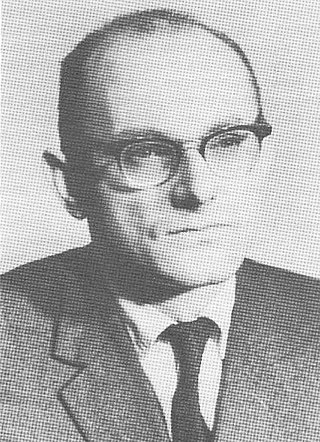
Stanisław Kociołek, often referred to as the "butcher of Tri-City", was a Communist official who served as deputy prime minister of Poland for six months in 1970. After the fall of Communism, he was charged with crimes committed in Gdańsk and Gdynia during the Polish 1970 protests. Kociołek personally approved the Polish United Workers' Party (PZPR) order issued with Zenon Kliszko, for the regular Army to fire at striking workers in Polish shipyards, which resulted in at least tens of people being killed indiscriminately and hundreds wounded.

Józef Czyrek was a Polish politician who served as the minister of foreign affairs of the People's Republic of Poland from 1980 to 1982.
The Upper Silesia 1980 strikes were widespread strikes, which took place mostly in the Upper Silesian mining cities Jastrzębie-Zdrój, Wodzisław Śląski and Ruda Śląska and its surroundings, during late August and early September 1980. They forced the Government of People's Republic of Poland to sign the last of three agreements establishing the Solidarity trade union. Earlier, agreements had been signed in Gdańsk and Szczecin. The Jastrzębie Agreement, signed on September 3, 1980, ended Saturday and Sunday work for miners, a concession that Government leaders later said cut deeply into Poland's export earnings.
References
- 1 2 3 Przegląd, Tygodnig. "Oni bali się nas, a my ich" . Retrieved 2008-11-30.
- ↑ Stefanowski, Roman (1983-07-01). "Poland under Martial Law". Archived from the original on 2007-04-20. Retrieved 2008-11-30.
- ↑ "Internowania byłych prominentów PRL". Archived from the original on 2011-08-18. Retrieved 2008-11-30.
- 1 2 3 4 5 6 7 Hunter, Richard J.; Leo V. Ryan (1998). From Autarchy to Market: Polish Economics and Politics 1945-1995. p. 48. ISBN 9780275962197.
- 1 2 3 Schafer, Susanne (1980-08-21). "Efforts by Polish government to end worker unrest stalled". Kingman Daily Miner. Retrieved 2008-11-30.[ dead link ]
- ↑ The date of death was announced at the main page of the http://www.gwsh.pl/ Katowice School of Economics] (retrieved on 25 May 2009). The obituary Archived 2009-06-26 at the Wayback Machine published there gave the date of the funeral for 27 May (it however did no contain the death of the date).